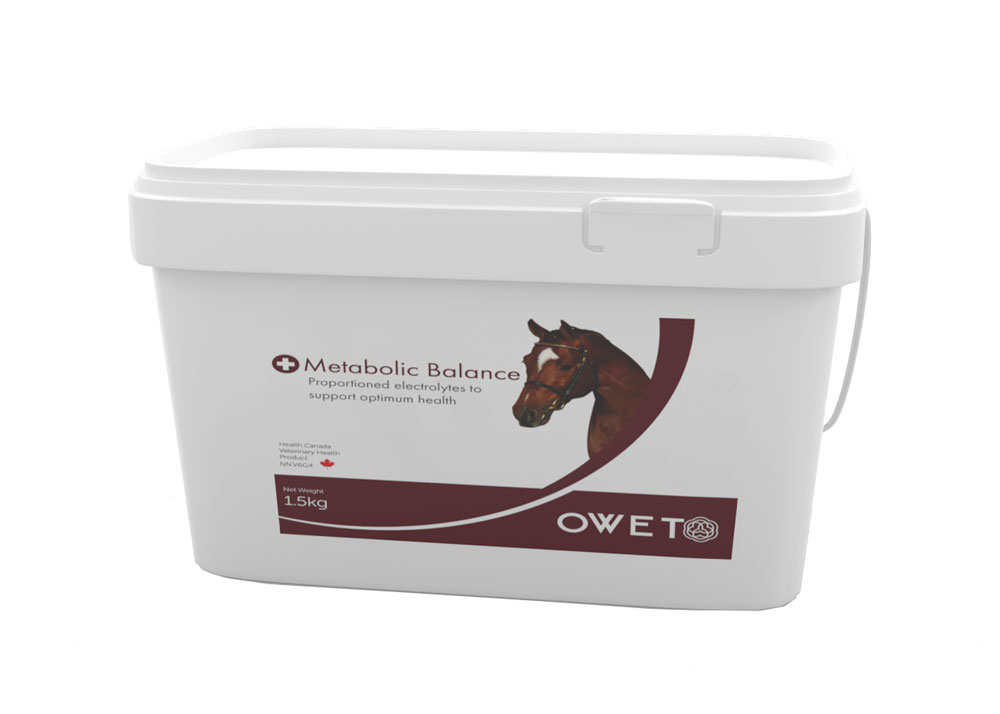
Metabolic Balance™ is scientifically formulated to replace — in the proper balance — the important minerals lost through the skin, mouth and kidneys through the course of normal daily activity. These include chloride, sodium, potassium, calcium and magnesium, together with fuel (dextrose, fructose) for cells in the intestinal system that absorb water and minerals.
Dehydration (water and electrolyte depletion) has serious health consequences. Every horse should use Metabolic Balance™ daily to optimise water and mineral nutrition year round. Hay, pasture and most grain feeds do not contain adequate or properly proportioned electrolytes to optimally meet the horse’s requirements. Good hydration and electrolyte balance underpins every system in the body and is a requirement for good health. Drinking water does not maintain or restore hydration. Drinking water with the proper proportion of electrolytes is required to maintain optimum hydration.
The continued use of this product, as recommended, assists in metabolic balancing, providing targeted nutrition to meet your horses’ needs.
Claims:
• Supports whole body and cellular hydration and electrolyte balance
Health Science for your Horse™
Approved in Canada as a Veterinary Health Product NN.V6G4
ALL Ingredients are GRAS approved for use in animal supplements in the EU and USA
Good hydration is the cornerstone of a horse’s performance. Dehydration has serious consequences on your horse’s mental and physical performance.
Ingredients & Nutritional Facts
• Sodium chloride
• Potassium chloride
• Calcium-citrate tribasic
• Magnesium sulfate
• Dextrose, Fructose
• Silicon dioxide
• Natural lemon flavour
Salt (NaCl) 2.93g
Sodium (Na) 1.14g
Chloride (Cl) 2.55g
Potassium (K) 1.02g
Calcium (Ca) <1g
Magnesium (Mg) <1g
Feeding Instructions & Contraindications
The optimum method for efficient hydration is to feed three (3) level scoop (32 grams) per litre of fresh ambient water, or 12 scoops per gallon of water.
Mix well and allow your horse to drink freely. Your horses sweating rate will be 1 – 2 gallons per hour during transport in warm conditions or per hour of moderate work.
Best when provided 1 – 2 hours before transport, 1 – 2 hours before exercise / competition, and immediately after exercise. The horse may need to be trained to drink the solution: start with a dilute solution (1 / 10th strength and increase to full strength over 1 to 2 weeks.
Do not provide just a water alternative.
An alternative feeding option would be to add 1 – 2 scoops mixed into the feed (not hay), add water and allow to soak for 30 minutes before feeding. Dry feeds should be wetted to minimize the risk of choke.
A feed supplement for horses not intended for food.
Store in a cool dry place, keep out of direct sunlight. Reapply lid after use..
Product Size:
500g
1.5kg
Dehydration (water and electrolyte depletion) has serious consequences. Every horse should use Metabolic Balance daily, especially the performance horse, in order to maintain correct levels of hydration, and in turn maintain optimum levels of performance and good health.
Hay, pasture or fortified grains do not contain enough electrolytes to meet the needs of the performance horse during training, during transport and during competition.
Metabolic Balance is scientifically formulated to replace — in the proper balance — the important mineral lost in sweat during exercise and transport: chloride, sodium, potassium, calcium and magnesium, together with fuel for cells in the intestinal system that absorb water and minerals (dextrose, fructose).
This concentrated product assists in metabolic balancing, providing targeted nutrition to meet your horses’ needs.
Consequences of Dehydration & Electrolyte Depletion
Even 1% dehydration results in:
• Decrease in mental performance
• Decrease in physical performance


Other clinical effects of dehydration
• Impaired neuromuscular excitability
• Cellular dehydration
• Elevated cellular metabolism
• Decreased plasma volume
• Oxidative stress
• Progressively increased heart rate
• Mitochondrial ATP production
• Cellular redox potential
• Decrease in blood pressure
